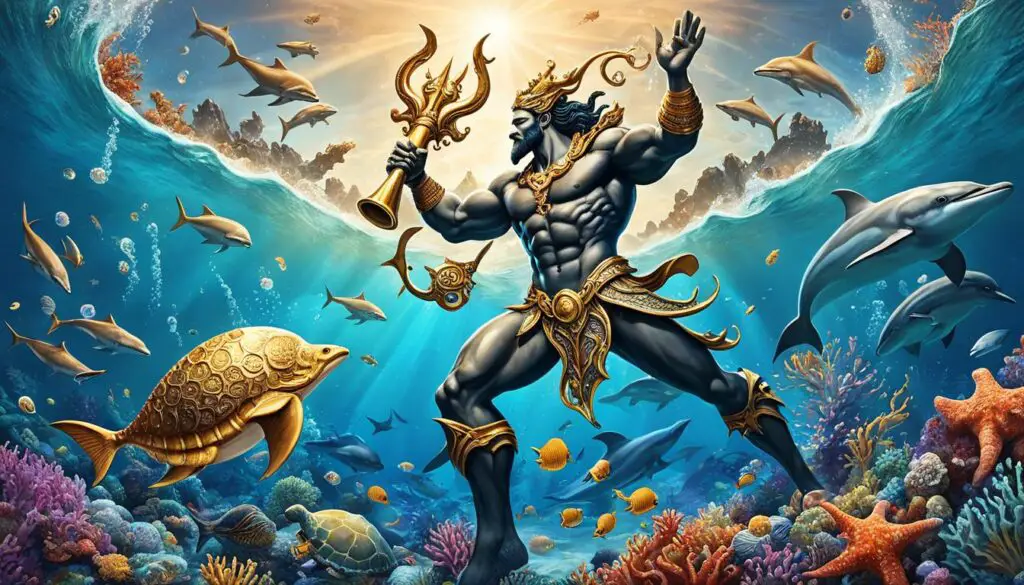Triton, the Greek sea god, is a prominent figure in Greek mythology. He is the son of Poseidon and Amphitrite, the god and goddess of the sea. Triton is often depicted as a merman, with the upper body of a human and the lower body of a fish. He is known for his conch shell trumpet, which he uses to control the waves. His story is deeply rooted in Greek folklore, where he is hailed as the messenger of Poseidon.
Key Takeaways:
- Triton is a significant figure in Greek mythology, known as the son of Poseidon and Amphitrite.
- He is often portrayed as a merman with a conch shell trumpet, symbolizing his control over the seas.
- Triton’s role as Poseidon’s messenger highlights his importance in Greek folklore.
- His abilities include manipulating and controlling the waves, inherited from his father.
- Exploring Triton’s mythology provides insight into the rich tapestry of Greek gods and their enduring legacy.
The Mythology of Triton
In Greek mythology, Triton is a deity associated with the sea. He is widely known as the Greek god Triton. As the son of Poseidon and Amphitrite, Triton possesses immense power and authority over the waves, which he inherited from his father.
Triton is an integral part of a divine family, with his father Poseidon being the god of the sea and his mother Amphitrite being a sea goddess. This familial connection highlights Triton’s significance in Greek mythology and his close association with the aquatic realm.
Triton’s family tree extends further, encompassing his siblings. Notable among them is Nereus, also known as the wise old man of the sea. Additionally, Triton has a group of sea nymphs called Nereids as his sisters.
To get a better understanding of Triton’s lineage and his important role within the Greek pantheon, let’s take a closer look at his family tree:
Triton’s Family Tree:
- Poseidon (father)
- Amphitrite (mother)
- Nereus (brother)
- Nereids (sisters)
Through this family tree, we can comprehend the intricate connections and relationships between Triton and other significant figures in Greek mythology. Triton’s lineage and powers further solidify his position as a formidable and influential deity in the ancient Greek world.
As we delve deeper into Triton’s mythology, we will explore his appearance, abilities, and his compelling role as the messenger of Poseidon.
Triton’s Appearance and Abilities
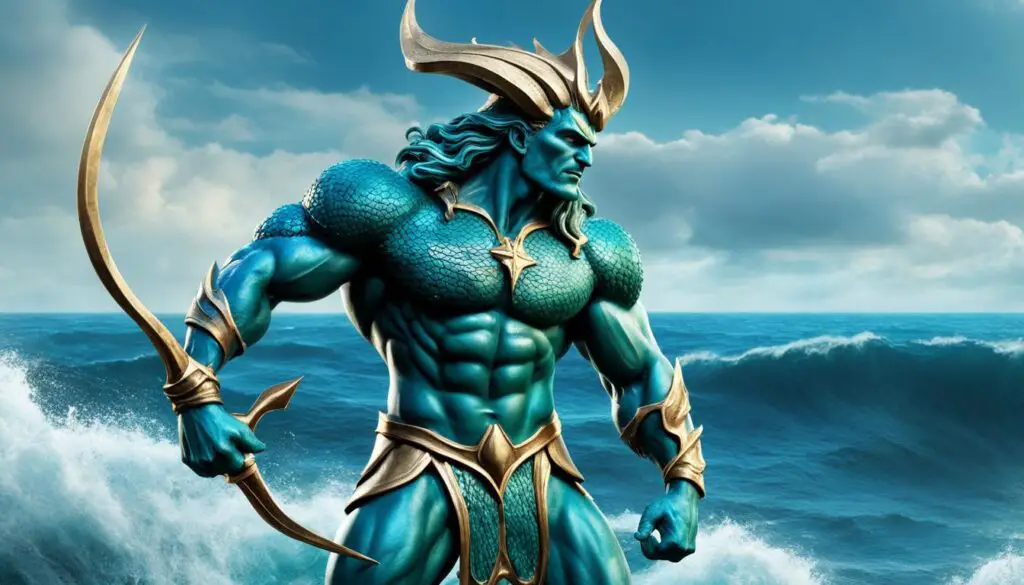
Triton, a prominent figure in Greek mythology, is often portrayed in Greek art as a majestic merman, captivating audiences with his unique appearance. With the upper body of a human and the lower body of a fish, Triton’s physical form is a testament to his deep connection to the sea.
At the heart of Triton’s depiction lies his symbol, the conch shell trumpet. This iconic instrument represents his ability to control the tumultuous waves of the ocean, cementing his significance in Greek folklore. As the lord of the seas, Triton possesses immense power over the aquatic realm, able to manipulate and calm or raise the waves at will.
Serving as a symbol of the vastness and power of the ocean, Triton’s appearance and abilities make him a revered and formidable figure in Greek mythology.
Triton as the Messenger of Poseidon
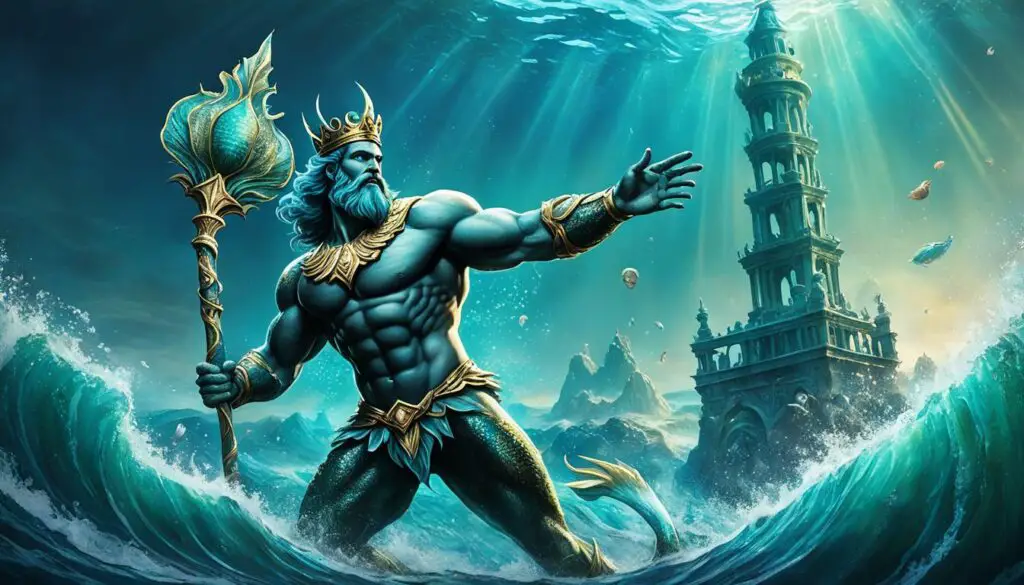
Triton plays a crucial role in Greek mythology as the messenger of Poseidon, the mighty god of the sea. As Poseidon’s trusted envoy, Triton acts as a herald, delivering important messages and announcements on behalf of the sea god.
Just as Hermes served as Zeus’ messenger, Triton serves as Poseidon’s messenger, representing his father in communication and representation within the realm of the sea. He holds a position of influence and significance, ensuring that Poseidon’s commands and decrees are heard and obeyed by both mortals and immortals.
Triton’s association with Poseidon showcases his important role in maintaining the order and harmony of the sea. His presence brings authority and legitimacy to the messages he delivers, promoting understanding and cooperation among the inhabitants of the underwater world. Triton’s role as the messenger of Poseidon reinforces his connection to the immense power and vastness of the ocean.
Importance and Influence
As Poseidon’s loyal emissary, Triton’s abilities and authority as a messenger are highly esteemed. He possesses the ability to command the attention of the sea creatures and beings, ensuring that his messages are heard far and wide.
In addition to his communication duties, Triton’s role as the messenger of Poseidon also grants him influence over sea-related matters. He has the power to shape the tides, calm or raise the waves, and protect sailors at sea. Triton’s position as Poseidon’s messenger gives him the authority to act as an intermediary between the sea god and those seeking his favor or guidance.
As a symbol of Poseidon’s will and power, Triton’s presence reminds all who encounter him of Poseidon’s might and the importance of maintaining a harmonious relationship with the sea.
Triton’s Family and Relationships
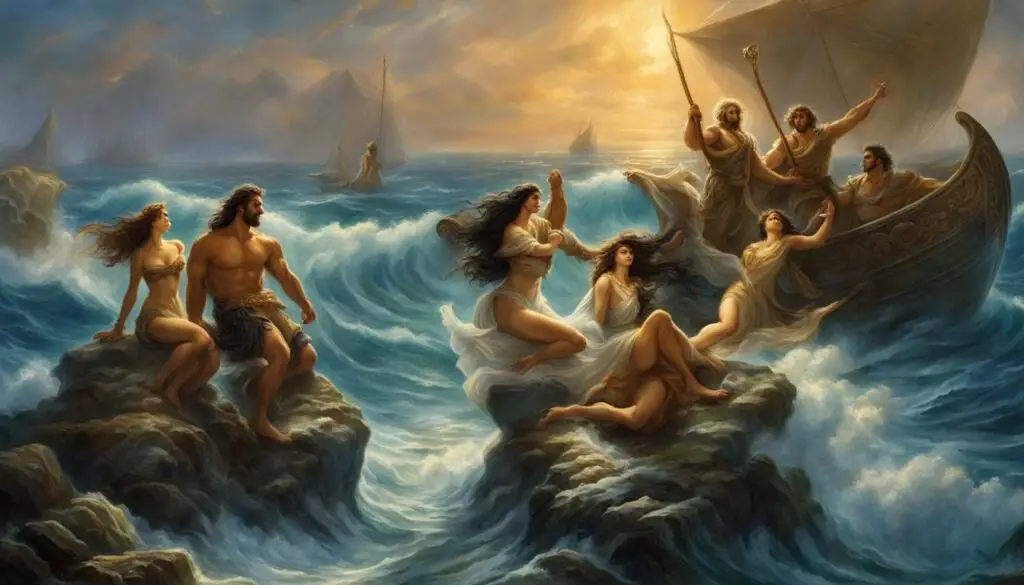
Triton’s mythology is intricately woven with his family ties, which play a significant role in shaping his story. As the son of Poseidon and Amphitrite, Triton inherits a unique heritage and powers that set him apart from other Greek deities.
Triton’s parents, Poseidon and Amphitrite, are revered as the god and goddess of the sea, respectively. Their union bestows upon Triton an innate connection to the ocean, and his merman form reflects this divine lineage.
Within the celestial hierarchy, Triton has several siblings who share a place in Greek mythology. His brothers include Nereus, often depicted as an ancient and wise sea god, and a spirited group of sea nymphs known as Nereids. These siblings further reinforce Triton’s role as part of a divine family connected to the realm of the sea.
Triton’s relationships extend beyond his immediate kin, as he also forms a romantic bond with Libya, a nymph from the region of Tritonis. This connection deepens his mythological narrative, showcasing his capacity for love and companionship.
Together, Triton and Libya bear children who add another layer of complexity to Triton’s story. Among their offspring are Triteia, Pallas, and Calliste, each contributing their unique attributes and myths to Triton’s lineage.
Triton’s Family and Relationships at a Glance:
- Parents: Poseidon and Amphitrite
- Siblings: Nereus (brother), Nereids (sea nymph sisters)
- Consort: Libya (nymph from Tritonis)
- Children: Triteia, Pallas, Calliste
Triton in Ancient Greek Art and Literature
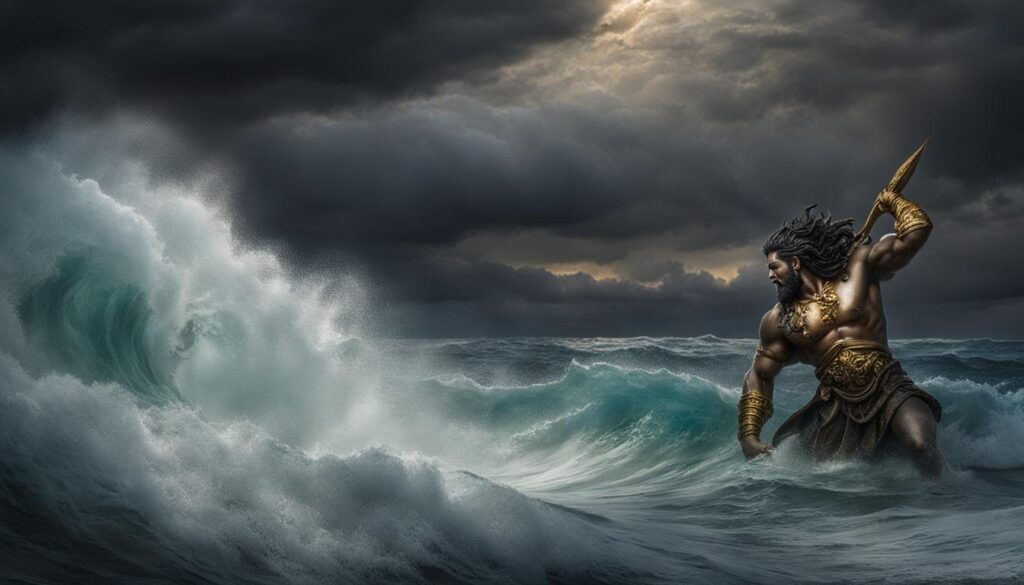
Triton’s portrayal in Greek art and literature provides a glimpse into how he was perceived in ancient times. Artists depicted Triton as a merman, showcasing his half-human, half-fish appearance. He is often shown blowing a conch shell trumpet, emphasizing his role as the messenger of the sea.
In Greek art, Triton is celebrated for his unique form, capturing the imagination of viewers with his majestic presence. Paintings, sculptures, and pottery often depict him alongside other sea creatures, emphasizing his association with the oceanic realm.
Furthermore, Triton’s presence in ancient literature further solidifies his importance and legacy in Greek mythology. He appears in epic poems like Homer’s Odyssey and Hesiod’s Theogony, where his role as Poseidon’s messenger is highlighted. These literary works immortalize Triton and his significant contributions to the Greek pantheon.
As a central figure in both Greek art and literature, Triton continues to captivate audiences to this day. His portrayal in visual masterpieces and influential texts serves as a testament to his enduring impact on Greek culture and mythology.
- Triton’s depiction in Greek art emphasizes his half-human, half-fish appearance.
- Artists often represented Triton blowing a conch shell trumpet, symbolizing his role as the messenger of the sea.
- In ancient literature, Triton’s presence is evident in epic poems and mythical tales, cementing his significance in Greek mythology.
Mythological Associations and Stories Involving Triton
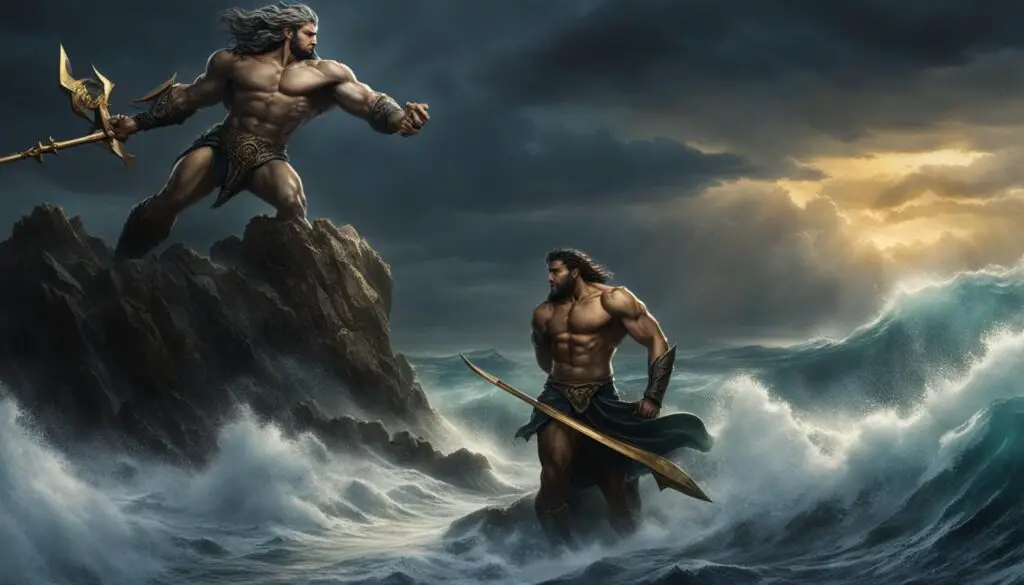
Triton, the Greek sea god, is intricately intertwined with several captivating mythological stories and events from ancient Greek lore. His involvement in these tales further adds depth and richness to his mythology.
Triton’s Role in the Argonauts’ Journey
One notable mythological association involving Triton is his role in the epic voyage of the Argonauts. As they embarked on their treacherous quest for the Golden Fleece, Triton served as a valuable ally to the heroes. With his extensive knowledge of the sea, he guided the Argonauts through challenging waters, ensuring they safely navigated their way to their destination.
Triton’s Encounter with Misenus
Another intriguing story revolves around Triton’s encounter with Misenus, a celebrated warrior and the son of Aeolus, the ruler of the winds. Misenus, known for his exceptional trumpet skills, foolishly challenged Triton to a musical contest, underestimating the sea god’s divine powers. In a display of his authority as Poseidon’s messenger, Triton effortlessly outperformed Misenus, leaving the warrior humbled and humiliated.
Triton’s Role in the Trojan War
Triton’s involvement in the legendary Trojan War further highlights his significance in Greek mythology. As Poseidon’s messenger, Triton acted as a conduit between the sea god and mortal warriors. He played a crucial role in delivering Poseidon’s messages and commands to the Trojans and the Greek forces, influencing the course of the battle.
These captivating mythological associations and stories shed light on Triton’s significant involvement in major events, such as the Argonauts’ journey and the Trojan War. They demonstrate his profound connection to the sea and his integral role as Poseidon’s messenger, further solidifying his place among the Greek gods.
Conclusion
Triton, the Greek sea god, is a captivating figure in Greek mythology. As the son of Poseidon and Amphitrite, Triton embodies the power and mystery of the ocean. His half-human, half-fish appearance and the iconic conch shell trumpet symbolize his control over the waves and his role as Poseidon’s messenger. Exploring Triton’s mythology provides us with a deeper understanding of the rich tapestry of Greek gods and their enduring legacy.
Triton’s significance in Greek folklore cannot be overstated. His lineage and unique abilities make him a central figure in the pantheon of gods. As the messenger of Poseidon, Triton helped bridge the gap between divine beings and mortal humans, delivering messages and commands during important events such as the Trojan War. His involvement in the Argonauts’ journey and his powerful encounter with Misenus further cemented his role in various mythological tales.
By delving into Triton’s myth and legend, we gain insight into the profound connection ancient Greeks had with the sea and the importance they placed on its power. Triton’s story serves as a reminder of the rich cultural heritage of Greece and the enduring fascination with mythological beings like himself. As we continue to explore Greek mythology, Triton’s legacy will continue to captivate and intrigue us with its depth and complexity.
FAQ
Who is Triton in Greek mythology?
Triton is the Greek sea god who is often depicted as a merman with the upper body of a human and the lower body of a fish. He is the son of Poseidon and Amphitrite and is known for his control over the waves using his conch shell trumpet.
What are Triton’s powers?
Triton possesses the power to manipulate and control the waves, inherited from his father Poseidon. He can calm or raise the waves at will, exhibiting his control over the sea.
Who are Triton’s family members?
Triton is the son of Poseidon and Amphitrite. He has several siblings, including Nereus, the wise old man of the sea, and a group of sea nymphs called Nereids. He also has a romantic relationship with Libya, a nymph, and together they have children, including Triteia, Pallas, and Calliste.
What is Triton’s symbol and significance?
Triton’s symbol is a conch shell, which represents his control over the seas. His insignia holds significant meaning as it emphasizes his connection to the vastness and power of the ocean.
What is Triton’s role in Greek mythology?
Triton serves as the messenger of Poseidon, acting as his herald and delivering messages and announcements on his behalf. He holds a position of influence and importance as the trusted envoy of the sea god.
How is Triton portrayed in Greek art and literature?
Triton is often depicted in Greek art as a merman blowing a conch shell trumpet. This portrayal emphasizes his role as the messenger of the sea. In ancient literature, Triton appears in epic poems and mythical tales, solidifying his significance and legacy in Greek mythology.
What mythological stories involve Triton?
Triton played a crucial role in the Argonauts’ journey, providing them with his knowledge of the sea. He also had a notable encounter with Misenus, where he demonstrated his power and authority as Poseidon’s messenger. Additionally, Triton played a role in the Trojan War, delivering messages and commands from Poseidon to mortal warriors.


